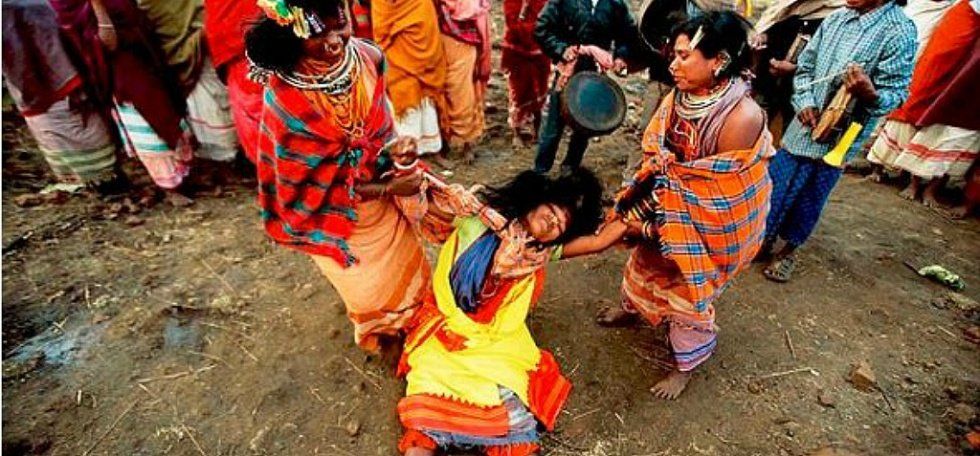By Sampurnaa Bora
One fine day, at noon, Poorni Orang, a 63-year-old woman of Bhimajuli village in the Sonitpur district was paraded naked, beaten up and beheaded by a mob of around 100 people who belonged to her own village.
Although in the present circumstances such heinous incidences of murder fail to take us by surprise or shock anymore owing to its extensive prevalence, it might be intriguing to investigate the situation leading to the causality of such incidences.
Reportedly, many people in the village to which Orang belonged were falling sick, and allegedly it was her presence or her black magic which was leading to those incidences.
This is called ‘witch hunting’, or daini hatya
in the native language, which has been prevalent in the state of Assam over centuries succeeded to be abated by a law namely The Assam Witch Hunting (Prohibition, Protection and Prevention) Bill 2015 only in the year 2018, three years after it being passed in the State’s Legislative Assembly.
So basically, what happens in witch hunting is that usually women and sometimes even families are inflicted violence by the fellow villagers or even relatives of the victims on the belief that those individuals are responsible for certain misfortunes in the community on account of their powers to conduct black magic.
Usually such belief is based on the branding of victims especially women as witches, and such branding is done by an ‘ojha’or ‘bez’, the witch doctor.
According to various sources, including research papers, the form of violence inflicted upon victims include beatings, burns, parading naked through village, being forced to eat human excrement and sometimes even rape.
Moreover, noting the fact that the issue of witch hunting is present in states other than Assam such as Jharkhand, Chhattisgarh, Bihar, and many others, it is rather a questionable matter as to why it fails to be addressed by a national policy till date. And it gets even more intriguing when we witness the fact that such sort of incidences are legitimised by a community of people.
Read More: Did Saravana Bhavan’s Owner Kill His Employee To Marry His Wife, Based On Astrologer’s Advice?
In fact, Poorni Orang’s incidence is just one of the many cases of demise of individuals due to witch hunting. Other incidences include families being forced to eat human excrements; women being buried alive in a well after being branded as witch.
Once a woman in Maligaon village was forced to leave the village when her son, who was accused of practicing black magic went missing.
In another incident, a 50-year-old woman, on being branded a ‘daini’ by a local priest thus being responsible for the ills being bought up in the village of Rangajan in the Tinsukia district, was dragged out of her house by a large group of people and lynched by the mob.
The recent law passed against witch hunting, which has been talked about above, is definitely going to be instrumental in legalising punishment against the ones who perpetrate violence in the name of witch hunting.
However, we need to pay heed to the need of the work to be done at the grassroot level which has been pointed by numerous journalist and research scholars and experts from various other fields.
Just like any other social evil, be it dowry or child marriage or caste discrimination, any other phenomenon rooted in the system of hierarchy cannot be completely uprooted from the society until and unless there is a change in the mindset of people , the same goes for this issue as well.
With this regard we definitely cannot go away with the recognition which certain individuals deserve due to their commendable contribution on field to solve the issue of witch hunting.
The first name that deserves to be mentioned here is that of Kuladhar Saikia, Director General of Police Assam, who initiated the first move against with hunting by launching Project Prahari in the year 2001, aimed at development of the community by bringing together various sections of the rural society.
The incident of five people being murdered in a single night in the year 2000 in Kockrajhar’s Thaiguri after being accused as witches was the reference point of the project.
After tremendous efforts all throughout the years today it covers 50 villages with it’s declaration as a state level project by the state’s director general of police.
The main reason behind Project Prahari’s success can be attributed to the clear understanding of the issue by Mr. Sikia.
Indeed, he understood the fact that the reason behind witch hunting doesn’t go one way. It involves the issues of illiteracy and under development in regions leading people to approach local doctors like ‘bez’ who incline them towards superstitious beliefs rather than rational scientific ones.
Similarly, the hierarchical structure of power in society among men and women, and other forms of groups along with family issues of jealousy and enmity over property rights have also played their role.
Therefore, he understood that a multi-lateral approach had to be adopted which is why he addressed the issue by dealing with grounds of empowerment through access to education and health, spreading awareness and developing community feelings.
Then comes Birubala Rabha who, after singlehandedly standing and raising her voice against witch hunting in 2005, has become the face of Mission Birubala.
In fact, she herself was also branded a witch, and today she works relentlessly to spread awareness about the issue.
She was suspected of practising witchcraft after her 12-year-old son was found suffering from a mental ailment and her husband had started falling ill frequently. And finally, on account of the demise of her husband as a result of throat cancer, their suspicion turned into a firm belief.
However, that couldn’t weaken her strong spirit. What makes her remarkable, is not just her ability to make her way out from the practise of witch hunting, but the zeal to prevent others from going through what she has been. Her fight against witchcraft has been an instrumental role in enabling Prevention of and Protection from Witch Hunting Act, 2015 passed by the Assam Government.
Moreover, all these are again part of her commendable work towards the society, she went ahead with organising associations for empowerment of women and stood firmly on her belief of nonexistence of witches.
She refused to take it back in spite threat of banishment from her fellow villagers and went on propagating it.
Thus, what we can surely say is that, there isn’t any need of explanation needed to back Birubala Rabha’s nomination for the Nobel Peace Prize Award in the year 2005.
Image Credits: Google Images, YKA
Sources: Al Jazeera, Wikipedia, India.com
Other Recommendations:

































Thank you bringing out the concern about Witch Hunting ‘. It was too good. You have depicted everything perfectly. It is infact a good step to spread awareness among all the people about such a horrible crime. I’m happy that you tried to bring out all the points within an easy access and understanding.
I want some more articles about topics like-
‘ Rape’, ‘Dowry ‘ and ‘ Robbery ‘. It is important to spread awareness among all the people of the Nation about all these illegal happenings. Plz ,I request you kindly to come up with some more articles to spread awareness, not only locally but in the National level. Hope you continue with your good work and keep bringing out concerns among the people. Plz try to forward your article on National level.
I want to see the articles based on the above mentioned topics. I shall be highly obliged if you give your kind consent. Thank you once again.